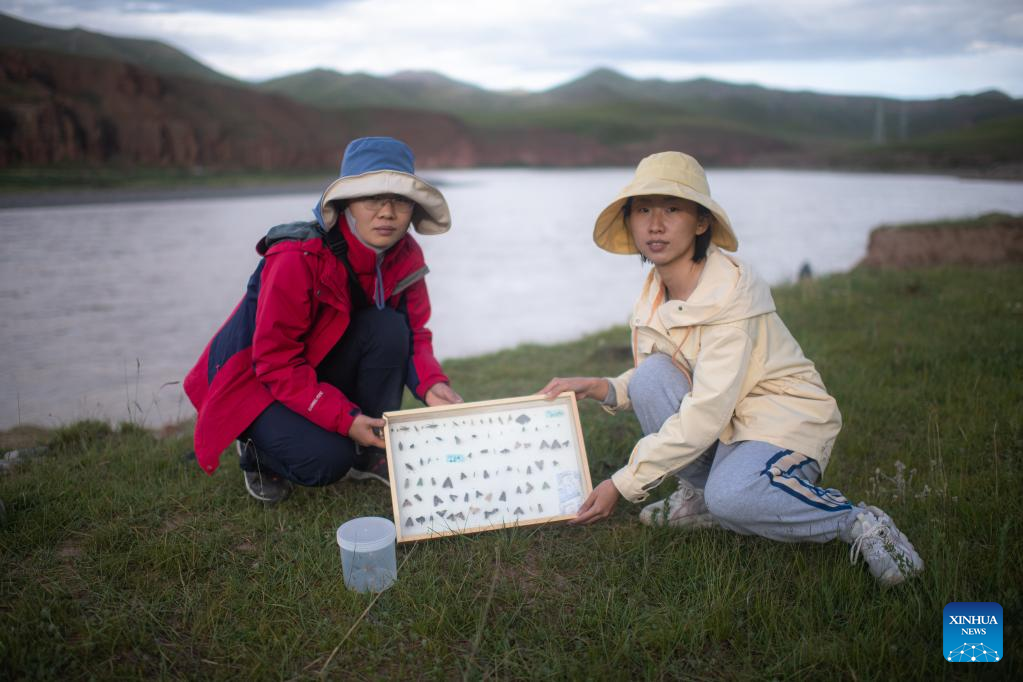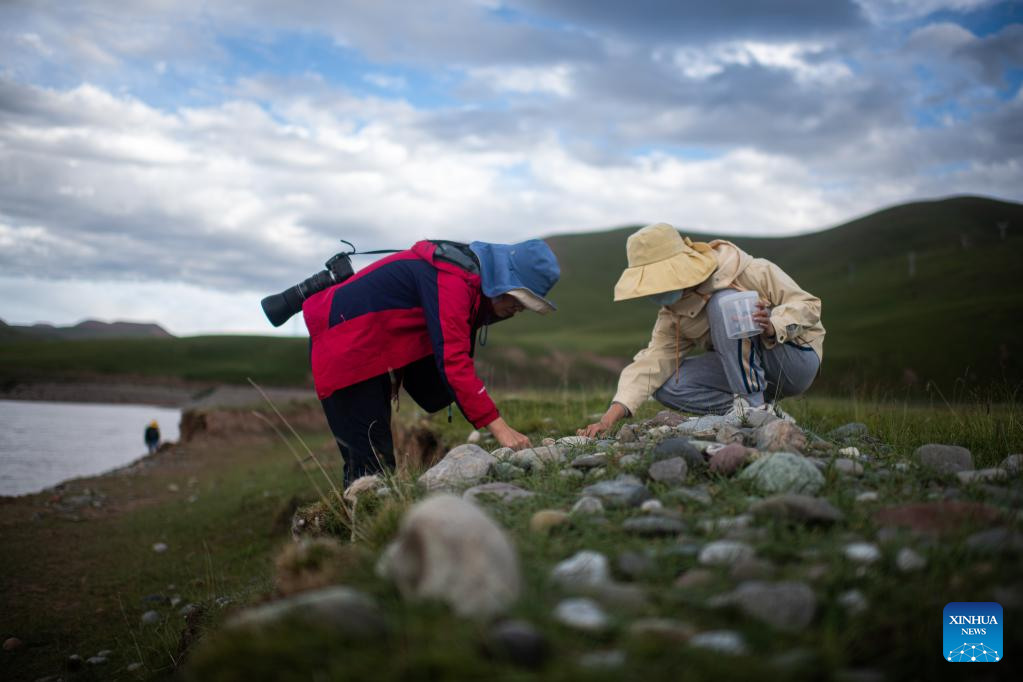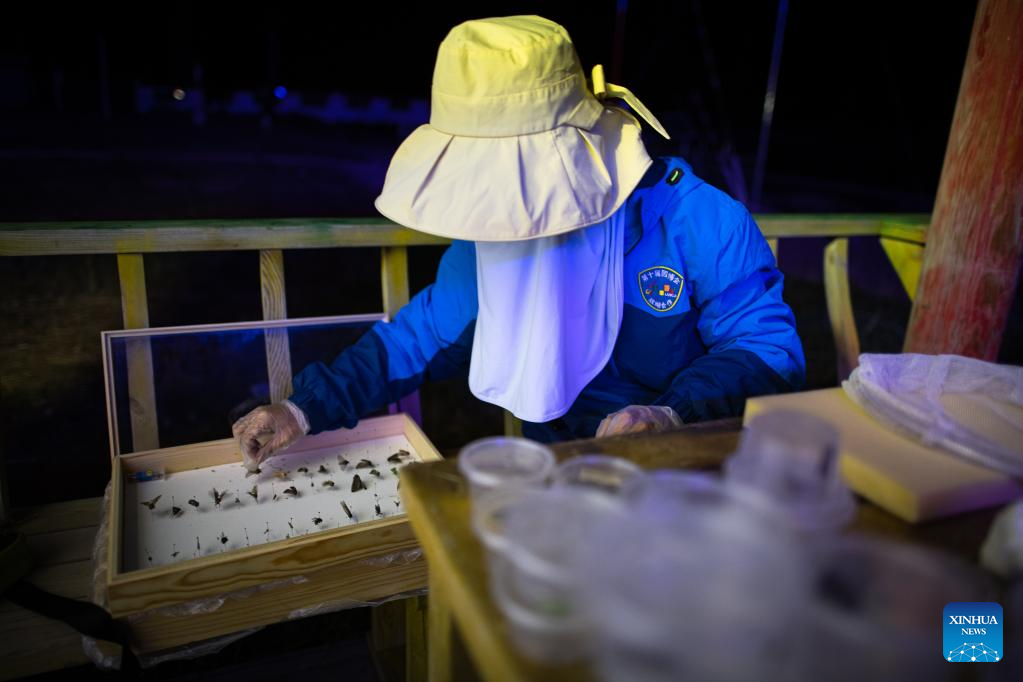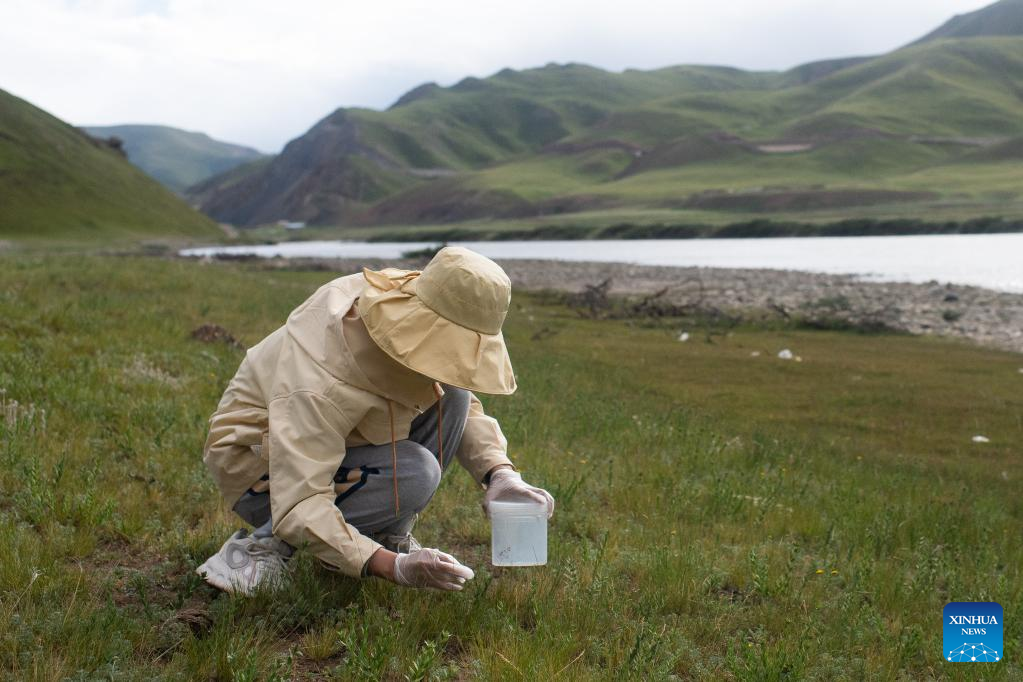
Zhang Guoyue (L) and Fan Yadong, members of a scientific expedition team, display insect specimens they have collected from a source of the Yangtze River in northwest China's Qinghai Province, July 26, 2022. Chinese scientists launched an expedition on Sunday in the headwater regions of the Yangtze and Lancang rivers in northwest China's Qinghai Province, to investigate the regions' water resources and ecological environment.
Zhang Guoyue and Fan Yadong are two female members of the scientific expedition team. To fulfill their duties as "insect catchers" for the sake of biodiversity survey, Zhang and Fan have to work day and night in the headwater regions of the Yangtze and Lancang rivers, regardless of fatigue from long hours of work, coldness at night, and thin air on the Qinghai-Tibet Plateau.
The expedition will conduct scientific investigations into the water resources, river hydrology, water ecology, glaciers, soil erosion and permafrost of the regions, among other things, according to the Changjiang River Scientific Research Institute (CRSRI) of the Changjiang Water Resources Commission, which is leading the expedition. (Xinhua/Xiao Yijiu)

Fan Yadong (L) and Zhang Guoyue, members of a scientific expedition team, collect insect samples from a source of the Yangtze River in northwest China's Qinghai Province, July 26, 2022. Chinese scientists launched an expedition on Sunday in the headwater regions of the Yangtze and Lancang rivers in northwest China's Qinghai Province, to investigate the regions' water resources and ecological environment.
Zhang Guoyue and Fan Yadong are two female members of the scientific expedition team. To fulfill their duties as "insect catchers" for the sake of biodiversity survey, Zhang and Fan have to work day and night in the headwater regions of the Yangtze and Lancang rivers, regardless of fatigue from long hours of work, coldness at night, and thin air on the Qinghai-Tibet Plateau.
The expedition will conduct scientific investigations into the water resources, river hydrology, water ecology, glaciers, soil erosion and permafrost of the regions, among other things, according to the Changjiang River Scientific Research Institute (CRSRI) of the Changjiang Water Resources Commission, which is leading the expedition. (Xinhua/Xiao Yijiu)

Zhang Guoyue (L) and Fan Yadong, members of a scientific expedition team, collect insect samples from a source of the Yangtze River in northwest China's Qinghai Province, July 26, 2022. Chinese scientists launched an expedition on Sunday in the headwater regions of the Yangtze and Lancang rivers in northwest China's Qinghai Province, to investigate the regions' water resources and ecological environment.
Zhang Guoyue and Fan Yadong are two female members of the scientific expedition team. To fulfill their duties as "insect catchers" for the sake of biodiversity survey, Zhang and Fan have to work day and night in the headwater regions of the Yangtze and Lancang rivers, regardless of fatigue from long hours of work, coldness at night, and thin air on the Qinghai-Tibet Plateau.
The expedition will conduct scientific investigations into the water resources, river hydrology, water ecology, glaciers, soil erosion and permafrost of the regions, among other things, according to the Changjiang River Scientific Research Institute (CRSRI) of the Changjiang Water Resources Commission, which is leading the expedition. (Xinhua/Xiao Yijiu)

Fan Yadong, a member of a scientific expedition team, observes an insect sample she has collected from a source of the Yangtze River in northwest China's Qinghai Province, July 26, 2022. Chinese scientists launched an expedition on Sunday in the headwater regions of the Yangtze and Lancang rivers in northwest China's Qinghai Province, to investigate the regions' water resources and ecological environment.
Zhang Guoyue and Fan Yadong are two female members of the scientific expedition team. To fulfill their duties as "insect catchers" for the sake of biodiversity survey, Zhang and Fan have to work day and night in the headwater regions of the Yangtze and Lancang rivers, regardless of fatigue from long hours of work, coldness at night, and thin air on the Qinghai-Tibet Plateau.
The expedition will conduct scientific investigations into the water resources, river hydrology, water ecology, glaciers, soil erosion and permafrost of the regions, among other things, according to the Changjiang River Scientific Research Institute (CRSRI) of the Changjiang Water Resources Commission, which is leading the expedition. (Xinhua/Xiao Yijiu)

Fan Yadong, a member of a scientific expedition team, makes insect specimens in northwest China's Qinghai Province, July 24, 2022. Chinese scientists launched an expedition on Sunday in the headwater regions of the Yangtze and Lancang rivers in northwest China's Qinghai Province, to investigate the regions' water resources and ecological environment.
Zhang Guoyue and Fan Yadong are two female members of the scientific expedition team. To fulfill their duties as "insect catchers" for the sake of biodiversity survey, Zhang and Fan have to work day and night in the headwater regions of the Yangtze and Lancang rivers, regardless of fatigue from long hours of work, coldness at night, and thin air on the Qinghai-Tibet Plateau.
The expedition will conduct scientific investigations into the water resources, river hydrology, water ecology, glaciers, soil erosion and permafrost of the regions, among other things, according to the Changjiang River Scientific Research Institute (CRSRI) of the Changjiang Water Resources Commission, which is leading the expedition. (Xinhua/Xiao Yijiu)

Fan Yadong, a member of a scientific expedition team, collects insect samples from a source of the Yangtze River in northwest China's Qinghai Province, July 26, 2022. Chinese scientists launched an expedition on Sunday in the headwater regions of the Yangtze and Lancang rivers in northwest China's Qinghai Province, to investigate the regions' water resources and ecological environment.
Zhang Guoyue and Fan Yadong are two female members of the scientific expedition team. To fulfill their duties as "insect catchers" for the sake of biodiversity survey, Zhang and Fan have to work day and night in the headwater regions of the Yangtze and Lancang rivers, regardless of fatigue from long hours of work, coldness at night, and thin air on the Qinghai-Tibet Plateau.
The expedition will conduct scientific investigations into the water resources, river hydrology, water ecology, glaciers, soil erosion and permafrost of the regions, among other things, according to the Changjiang River Scientific Research Institute (CRSRI) of the Changjiang Water Resources Commission, which is leading the expedition. (Xinhua/Xiao Yijiu)



